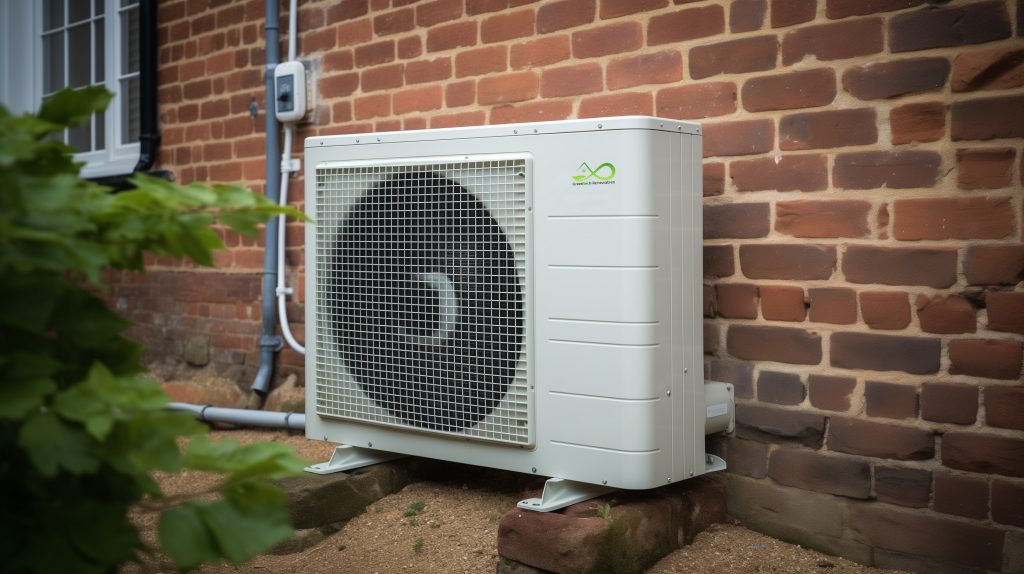Discover high-efficiency Air Source Heat Pumps from Greentech Renewables. Reduce energy bills and carbon footprint with government-backed heating solutions.
How Do Air Source Heat Pumps Work?
Harnessing Renewable Energy for Your Home
Air source heat pumps extract heat from the outside air and convert it into usable energy for heating and hot water. The system operates efficiently throughout the year, making it a practical solution for residential heating.
Key Features of Air Source Heat Pumps
- Delivers up to 400% efficiency, producing up to 4kW of heat per 1kW of electricity used
- Compatible with radiators, underfloor heating, and hot water cylinders
- Reduces carbon emissions by up to 70% compared to gas boilers
Benefits of Air Source Heat Pumps
Lower Energy Bills & High Efficiency
- Reduces heating costs compared to traditional gas and oil systems
- Optimized for smart tariffs and off-peak electricity savings
- Provides long-term financial savings
Environmentally Friendly & Low-Carbon Heating
- Reduces reliance on fossil fuels and contributes to the UK’s Net Zero 2050 target
- Operates with minimal carbon emissions
- Can be paired with solar panels for increased energy efficiency
Government Incentives & Grants
- Boiler Upgrade Scheme offers up to £7,500 towards installation costs
- Zero VAT on heat pumps until 2027
- Eligibility for additional financial incentives through energy efficiency programs
Is an Air Source Heat Pump Right for Your Home?
Key Considerations Before Installation
- Well-insulated homes maximize efficiency and cost savings
- Works with existing radiator systems and underfloor heating
- Requires an outdoor space of approximately 1-2m² for the external unit
Greentech Renewables provides tailored assessments to determine the best heat pump solution for each home.
Installation & Maintenance
Installation Process
- Home assessment to determine heating requirements
- Installation of the external unit and connection to the heating system
- System testing and optimization for peak performance
Most installations take two to three days, depending on the complexity of the system.
Ongoing Maintenance for Efficiency
- Annual servicing ensures consistent performance
- Regular cleaning of air filters and refrigerant checks
- Heat pumps typically last 15 to 20 years with proper maintenance
Air Source Heat Pumps vs. Gas Boilers
| Feature | Air Source Heat Pump | Gas Boiler |
|---|---|---|
| Energy Source | Renewable air heat | Fossil fuels |
| Efficiency | Up to 400% | ~90% |
| Carbon Emissions | Low | High |
| Running Costs | Lower (long-term) | Higher |
| Lifespan | 15-20 years | 10-15 years |
| Government Incentives | Up to £7,500 grant | No incentives |
Air source heat pumps provide a cost-effective, environmentally friendly heating solution compared to traditional gas boilers.
Frequently Asked Questions
How much does an air source heat pump cost?
The average installation cost ranges from £10,000 to £13,000, but government grants help reduce upfront costs.
Do air source heat pumps work in winter?
Yes, air source heat pumps are designed to function efficiently in temperatures as low as -15°C.
Are air source heat pumps noisy?
Modern air source heat pumps produce minimal noise, similar to a household refrigerator.
Do I need planning permission?
In most cases, planning permission is not required as air source heat pumps fall under permitted development rights.
Get a Free Consultation with Greentech Renewables
Call: 0333 577 7010
Greentech Renewables provides expert guidance and professional installation services for homeowners looking to upgrade to an energy-efficient heating system.
Why Choose Greentech Renewables?
- Industry expertise in renewable heating solutions
- End-to-end support from consultation to installation and maintenance
- Competitive pricing with access to government incentives
Thousands of UK homeowners are switching to air source heat pumps. Greentech Renewables offers a seamless process for making the transition to sustainable home heating.
Air source heat pumps provide a practical, cost-effective, and environmentally friendly alternative to traditional heating systems. With government incentives available, now is the ideal time to upgrade.
Contact Greentech Renewables today to learn more about transitioning to a more sustainable home heating system.
Cut Installation Costs in Half—Heat Pumps with BUS Scheme Grants!
For many homeowners in the UK, the upfront cost of installing an air source heat pump can be a significant concern. While it’s true that initial expenses may seem high compared to traditional heating systems, it’s important to consider the long-term savings on energy bills and the financial incentives available. Government grants, such as the Boiler Upgrade Scheme, can help reduce the cost, making air source heat pumps more accessible than you might think. Investing in an air source heat pump not only pays off in the long run but also contributes to a sustainable future.
Contact Greentech Renewables for straightforward advice on the best financial options for your installation.
Simplifying Air Source Heat Pump Installation
Installation challenges can feel daunting, especially when considering retrofitting an air source heat pump into an existing property. Issues like ensuring proper placement, upgrading insulation, or integrating with existing radiators may seem complex. However, with expert guidance, the installation process can be straightforward and minimally disruptive. Our experienced team ensures that all requirements are met while working to complete the installation as quickly and efficiently as possible.
Reach out to Greentech Renewables for honest guidance on simplifying the installation process for your home.
Freeze-Proof Heating: Efficiency Even Below Zero
Worried about how an air source heat pump will perform during those harsh UK winters? With freeze-proof heating, you don’t have to be. Our advanced heat pump technology is designed to keep your home warm and comfortable even when temperatures drop below zero. Unlike traditional systems, which can struggle in freezing conditions, our heat pumps maintain optimal efficiency, ensuring reliable heating without skyrocketing electricity costs. The technology works by extracting heat from the air, even in sub-zero temperatures, to keep your energy use low and your home cozy.
By prioritizing efficient operation year-round, you can enjoy consistent warmth without worrying about a spike in your bills when the weather turns icy. It’s time to embrace a heating system that doesn’t just survive the cold—it thrives in it.
Contact Greentech Renewables for expert advice on finding the right freeze-proof heating solution for your home.
No Space? No Problem: Air Source Heat Pumps for Urban Living
No space? No problem. When it comes to urban living, finding room for a traditional heating system can be challenging. Air source heat pumps offer a smart solution, fitting seamlessly into tight spaces and compact properties. Designed with urban settings in mind, these systems provide reliable heating without taking up valuable room inside or outside your home. Whether you have a small garden, narrow courtyard, or limited indoor space, there’s an air source heat pump that works for you.
Don’t let space constraints keep you from enjoying the benefits of efficient, renewable heating. Contact Greentech Renewables today to learn how you can heat your home without compromising on space.


